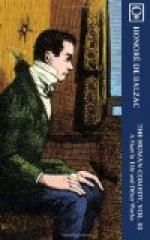Though each seat of this vehicle, with rounded sides like those of a pregnant woman, could rightfully carry only three passengers, it was not uncommon to see eight persons on the two seats jammed together like herrings in a barrel. Pierrotin declared that the travellers were far more comfortable in a solid, immovable mass; whereas when only three were on a seat they banged each other perpetually, and ran much risk of injuring their hats against the roof by the violent jolting of the roads. In front of the vehicle was a wooden bench where Pierrotin sat, on which three travellers could perch; when there, they went, as everybody knows, by the name of “rabbits.” On certain trips Pierrotin placed four rabbits on the bench, and sat himself at the side, on a sort of box placed below the body of the coach as a foot-rest for the rabbits, which was always full of straw, or of packages that feared no damage. The body of this particular coucou was painted yellow, embellished along the top with a band of barber’s blue, on which could be read, on the sides, in silvery white letters, “Isle-Adam, Paris,” and across the back, “Line to Isle-Adam.”
Our descendants will be mightily mistaken if they fancy that thirteen persons including Pierrotin were all that this vehicle could carry. On great occasions it could take three more in a square compartment covered with an awning, where the trunks, cases, and packages were piled; but the prudent Pierrotin only allowed his regular customers to sit there, and even they were not allowed to get in until at some distance beyond the “barriere.” The occupants of the “hen-roost” (the name given by conductors to this section of their vehicles) were made to get down outside of every village or town where there was a post of gendarmerie; the overloading forbidden by law, “for the safety of passengers,” being too obvious to allow the gendarme on duty—always a friend to Pierrotin—to avoid the necessity of reporting this flagrant violation of the ordinances. Thus on certain Saturday nights and Monday mornings, Pierrotin’s coucou “trundled” fifteen travellers; but on such occasions, in order to drag it along, he gave his stout old horse, called Rougeot, a mate in the person of a little beast no bigger than a pony, about whose merits he had much to say. This little horse was a mare named Bichette; she ate little, she was spirited, she was indefatigable, she was worth her weight in gold.




